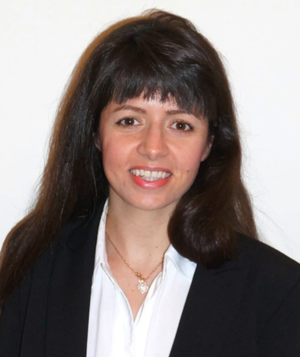Dunia Abdul-Aziz, M.D.
Meet the Researcher
Abdul-Aziz received her medical degree from Harvard Medical School, jointly with the Massachusetts Institute of Technology. She is an instructor of otolaryngology at Harvard Medical School and a surgeon-scientist at Mass Eye and Ear. Her 2019 Emerging Research Grant was generously supported by donors to Hearing Health Foundation.
The fate of most of us as we age is that we will lose hearing, and some of us will lose it more rapidly or precipitously. As an otologist/neurotologist, I help care for patients with hearing loss and diseases of the ear. My goal in the lab is to be able to discover new therapies for hearing loss with a focus on hair cell regeneration.
I developed a method to help target and study specific pathways in hair cell development by using viruses to block or boost relevant proteins. It was so exciting to see results showing the system works. We have since used it to study several pathways, including in my present research, and hope to share this method with the larger research community.
Scientists have long wondered why certain cells in the body are able to regenerate while others are not. For example, cells in our gut are continuously turning over because precursor stem cells are constantly making all the different subtypes of cells that line the intestine. In contrast, the inner ear, and in particular the sensory hair cells that encode sound, does not regenerate, although we know that precursor stem cells are present.
A key feature of stem cells is that their DNA is open and ready to be altered by specific signaling pathways. Epigenetics refers to those factors that alter how open or closed the DNA is. It is important in cellular reprogramming and in cancer, and drugs can target specific epigenetic pathways that alter the openness of the DNA. Could we use epigenetics to promote
regeneration of hair cells in the ear? This led to identifying the epigenetic regulator, lysine-specific demethylase 1 (Lsd1), that we think may be important.
I was born in Iraq and my family moved here when I was 8. My father is an engineer, often reading the encyclopedia to learn how things worked. I knew I wanted to be a doctor since I was a child, and I joined a lab as a college freshman and never left. That’s when I realized
I wanted to be a physician-scientist. I am motivated by the promise of bench-to-bedside as well as bedside-to-bench discoveries.
Dunia Abdul-Aziz, M.D., is funded by donors to Hearing Health Foundation who designated their gifts for the most promising research. These projects address the full range of hearing and balance science.
Click to download a PDF of Dr. Abdul-Aziz's Meet the Researcher profile.
The Research
Mass Eye and Ear, Harvard Medical School
Targeting epigenetics to restore hair cells
Most commonly, deafness is due to loss of cochlear sensory hair cells, which can occur because of genetic diseases, loud noise, certain drugs, or aging, and it can also result in the development of sometimes disabling ringing in the ear (tinnitus) and sound sensitivity (hyperacusis). Balance disorders similarly arise from loss of respective sensory hair cells in the inner ear vestibular organ. Treatments aimed at reversing hearing loss by stimulating the recovery of hair cells are greatly needed. The death of these hair cells in the ear is permanent because the inner ear loses its ability to replenish lost cells once it has matured, which occurs shortly after birth in mice and in the fetus in humans. To reestablish this potential and to recover lost hair cells, this project uses a novel technology to reprogram stem cells from the inner ear to turn into hair cells. This has pointed to a new candidate drug target, lysine-specific demethylase 1 (Lsd1), an epigenetic regulator that appears to be at least partly responsible for this loss of regenerative capacity. By targeting Lsd1, this project will study its role in the formation of hair cells and investigate its potential as a drug target for treatment of hearing loss.
Long-term goal: To develop novel therapies for hearing loss, balance disorders, tinnitus, and hyperacusis through the better understanding of hair cell development, maturation, and aging.

